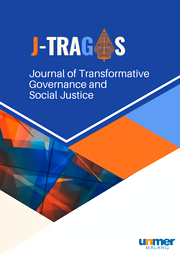Collaborative Governance in the Development of Singhasari Special Economic Zone
DOI:
https://doi.org/10.26905/j-tragos.v2i1.11239Keywords:
Collaborative Governance, SEZ Singhasari, Area Development, SingosariAbstract
The SEZ Singhasari, established through Government Regulation No. 68 of 2019, was targeted to be operational by 2022, and on October 11, 2022, it was declared ready to receive investors. However, empirically, SEZ Singhasari experienced slight delays in its readiness compared to other SEZs in general, indicating a lack of effectiveness in the collaborative relationship between the government and various other actors in accelerating the operation of SEZ. Based on this background, the research problem is framed around understanding and addressing the challenges and dynamics associated with the Collaborative Governance Model in the development of the Special Economic Zone (SEZ) Singhasari, to identify the initial conditions, facilitative leadership, institutional design, and analyzing the collaborative process and interim results in the development of SEZ Singhasari. This research adopts a descriptive qualitative approach with Singosari District as the selected location. The data sources for this research include primary and secondary data, collected through interviews, observations, and documentation. The research instruments used are the researcher, interview guidelines, field notes, and supporting tools. The data analysis follows Creswell's method of data analysis and is tested through source triangulation and data collection technique triangulation. Despite power and resource imbalances among actors, collaboration is facilitated due to mutual interdependence. Face-to-face dialogues through incidental coordination meetings are employed in the collaborative process, emphasizing communication, trust, and consensus in decision-making. The regulations and the establishment of the SEZ Singhasari Operationalization Acceleration Team support coordination and institutional design. SEZ Singhasari has implications for students and the surrounding community, enhancing land valuation and economic activities. These impacts strengthen collaboration and drive stakeholders toward achieving their planned goals.
Downloads
References
Alam, B. (2023). Implementation of Village Fund Management in Acceleration of Development in Sukojati Village Banyuwangi Regency. Journal of Transformative Governance and Social Justice, 1(2), 68-76.
Anggara, S., & Sumantri, I. (2016). Admnistrasi Pembangunan Teori dan Praktik. Pustaka Setia, 1689–1699.
Ansell, C., & Gash, A. (2008). Collaborative Governance in Theory and Practice. Journal of Public Administration Research and Theory, 18(4), 543–571. https://doi.org/10.1093/jopart/mum032
Basmar, E., Sartika, S. H., Suleman, A. R., Faried, A. I., Damanik, D., Amruddin, A., Purba, B., Wisnujati, N. S., & Nugraha, N. A. (2021). Ekonomi Pembangunan: Strategi dan Kebijakan. In Yayasan Kita Menulis.
Badan Pusat Statistik. (2022). Pertumbuhan Ekonomi Indonesia Triwulan II-2022.
Camarihna-Matos, M.L., & Afsarmanesh, H. (2008). Concept of collaboration: Information science reference. New York: Hersey.
Gie, T. L. (1982). Pengertian, Kedudukan dan Perincian Ilmu Administrasi.
Hasan, M., & Aziz, M. (2018). Pembangunan Ekonomi & Pemberdayaan Masyarakat: Strategi Pembangunan Manusia Perspektif Ekonomi Lokal (2nd ed.). CV Nur Lina.
Indonesia. Peraturan Pemerintah Republik Indonesia Nomor 40 Tahun 2021 Tentang Penyelenggaraan Kawasan Ekonomi Khusus.
Indonesia. Peraturan Presiden Republik Indonesia Nomor 60 Tahun 2015 Tentang Rencana Kerja Pemerintah Tahun 2015.
Indonesia. Undang-Undang Republik Indonesia Nomor 7 Tahun 2007 Tentang Rencana Pembangunan Jangka Panjang Nasional Tahun 2005-2025.
Indonesia. Undang-Undang Nomor 39 Tahun 2009 Tentang Kawasan Ekonomi Khusus.
Indradi, S. S. (2006). Dasar-dasar dan Teori Administrasi Publik. Yayasan Pembangunan Nasional Malang.
Luthfi, A., & Naufal, M. F. (2023). Mapping the Public-Private Partnership Researches in Waste Management: A Bibliometric Analysis. Journal of Transformative Governance and Social Justice, 1(2), 77-91. https://doi.org/10.26905/j-tragos.v1i2.10462
Maksudi, B. I. (2017). Dasar-dasar Administrasi Publik (Dari Klasik Ke Kontemporer). Rajawali Pers.
Natalis, A., & Hakim, A. R. (2021). Politik Hukum Permendag Nomor 48 Tahun 2018 Dalam Perspektif Hukum Progresif. Masalah-Masalah Hukum, 50(4), 373–386.
Sanaghan, P., & Lohndorf, J. (2015). Collaborative leadership: The New Leadership Stance. Collaborative Leadership in Higher Education, 6-37.
Sugiyono. (2013). Metode Penelitian Kuantitatif, Kualitatif, dan R&D. Alfabeta.
Sukardi, S. (2014). Good Governance: Reposisi Administrasi Publik, Lensa Kapital Sosial. Publisia: Jurnal Ilmu Administrasi Publik, 18(1), 21-43. https://doi.org/10.26905/pjiap.v18i1.2026
United Nations. (2020). United Nations Demographic Yearbook 2020.
Wihastuti, L. (2008). Pertumbuhan Ekonomi Indonesia: Determinan dan Prospeknya. Jurnal Ekonomi & Studi Pembangunan, 9(1), 30660.
Downloads
Published
How to Cite
Issue
Section
License
Authors who publish in this journal agree to the following terms:
(1) Copyright of the published articles will be transferred to the journal as the publisher of the manuscripts. Therefore, the author confirms that the copyright has been managed by the journal.
(2) Publisher of the Journal of Transformative Governance and Social Justice (J-TRAGOS) is the University of Merdeka Malang.
(3) The copyright follows Creative Commons Attribution “ShareAlike License (CC BY SA): This license allows to Share” copy and redistribute the material in any medium or format, Adapt” remix, transform, and build upon the material, for any purpose, even commercially.




